

Noun Project: Free Icons & Stock Photos for Everything. Is it time to KO the Knowledge Organiser? What if tools commonly used in the classroom threaten to inhibit the learning they were developed to support?
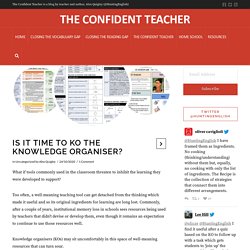
Too often, a well-meaning teaching tool can get detached from the thinking which made it useful and so its original ingredients for learning are long lost. Commonly, after a couple of years, institutional memory loss in schools sees resources being used by teachers that didn’t devise or develop them, even though it remains an expectation to continue to use those resources well. Knowledge organisers (KOs) may sit uncomfortably in this space of well-meaning resources that can turn sour. KOs are now ubiquitous in so many schools across the country. After being coined in secondary schools, they are now much more common in primary schools too, covering a vast array of topics. As a planning resource, the KO has likely proven a useful receptacle for key vocabulary and the salient facts for a given topic.
Stop, elaborate and listen! Flashcards and self-testing. Frayer model example: Related. Simon Haughton's Computing Curriculum - Knowledge Organisers. Using knowledge organisers. A knowledge organiser is a single sheet of paper that lists the important facts – not practical skills – that pupils should know by the end of a unit of work.
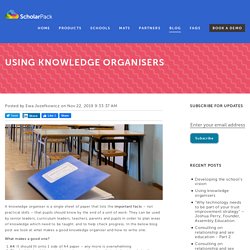
They can be used by senior leaders, curriculum leaders, teachers, parents and pupils in order to plan areas of knowledge which need to be taught, and to help check progress. Huntingtree Primary School. Wells Hall Primary School - Knowledge Organisers. Wells Hall Primary School Learning Together, Learning for Life Con la tecnología de Traductor de Google Wells Hall Road, Great Cornard, Sudbury, Suffolk, CO10 0NH admin@wellshallprimary.co.uk Proud to be part of the - Unity Schools Partnership Welcome to our new site...
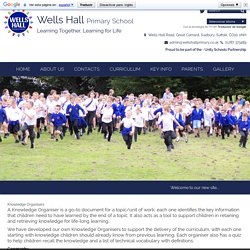
Science knowledge organiser animals inc humans. Year 5 Lent A French Revolution. History James I and the Gunpowder Plot Lent A. Geography Western Europe Michaelmas B. Year 3 History Ancient Greek Philosophy and Alexander the Great. Curriculum Overview Document.170606584. Writing good multiple choice exams fic 120116. Organising knowledge: The purpose and pedagogy of knowledge organisers. What do we mean by 'knowledge rich' anyway?
Recently, I published a blog on the EEF website on a ‘knowledge rich’ curriculum – you can find it here.
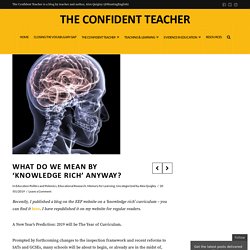
I have republished it on my website for regular readers. A New Year’s Prediction: 2019 will be The Year of Curriculum. Prompted by forthcoming changes to the inspection framework and recent reforms to SATs and GCSEs, many schools will be about to begin, or already are in the midst of, curriculum reviews. Want a quick no-quiz retrieval strategy? Increase learning with Two Things! — Retrieval Practice.org. Here's the scoop: At any point during a lesson, stop and have students write down Two Things about a specific prompt.
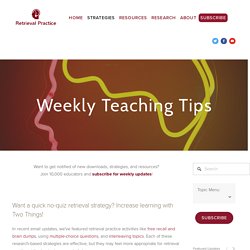
For example: What are two things you learned so far today? What are two things you learned yesterday (or last week)? Recall: What Is It Good For? (Absolutely Loads Of Things) – The Teaching Booth. Knowledge rich teaching? How can it not be? This is the optimum way to compile a multiple-choice test, according to psychology research. Knowledge Organisers and Quiz Sheets. A quick post to share a couple of thoughts and some resources.
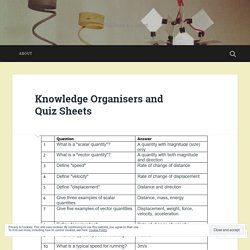
I think we have been mixing up two, equally important but different things when we’ve talked about knowledge organisers in science, or at least I have. Sharing the structure of the knowledge, its organisation, is a really important thing to do with students, as described by Frederick Reif in “Cognitive Science in Science Education”. This should look something like a schema or concept map, with links showing how different things relate to each other. What is a ‘knowledge-rich’ curriculum?
Medieval monarchs final draft 1. Sadie McCleary's Guide to Making and Using Knowledge Organizers. Sadie and Her UCC HS Chemistry Class Sadie McCleary, Chemistry Teacher extraordinaire and Science Department Lead at Uncommon Collegiate Charter High School, is a good friend of Team TLAC.
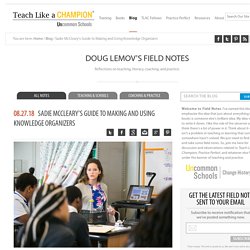
She’s a TLAC Fellow and constantly keeps in touch to share ideas she’s adapting and developing. And she has a special interest in Knowledge Organizers. This year she’s been trying to support other teachers in designing and implementing them effectively. She put together a quick guide that we (i.e. The first section shows an annotated model of a Knowledge Organizer for a Chemistry class with some great clarifying comments. The vocabulary / key concepts are the foundational terms students should know in order to increase the rigor of the questioning possible by the teacher and increase the quality of student responses. The second section shows how to use diagrams. The third section is our favorite–it focuses on how to use the Knowledge Organizer during class. Sadie McCleary's Guide to Making and Using Knowledge Organizers. Living Things. Light. Knowledge organiser Romans Anglo Saxons and Vikings.
Evolution. Electricity. Animals. I’m bringing knowledge back. This article was first featured in the wonderful Teach Primary.
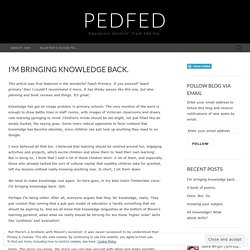
If you yourself ‘teach primary’ then I couldn’t recommend it more. It has thinky pieces like this one, but also planning and book reviews and things. It’s great. Reducing workload and maximising progress… – Midland Knowledge Hub. This is the transcript of my talk at the Midland Knowledge Hub Launch.
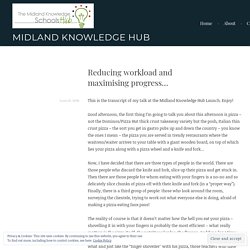
Enjoy! Good afternoon, the first thing I’m going to talk you about this afternoon is pizza – not the Dominos/Pizza Hut thick crust takeaway variety but the posh, Italian thin crust pizza – the sort you get in gastro pubs up and down the country – you know the ones I mean – the pizza you are served in trendy restaurants where the waitress/waiter arrives to your table with a giant wooden board, on top of which lies your pizza along with a pizza wheel and a knife and fork… Now, I have decided that there are three types of people in the world.
There are those people who discard the knife and fork, slice up their pizza and get stuck in. What is a knowledge-rich curriculum? Principle and Practice. I have found recent discussions and debates about the concept of a ‘knowledge-rich curriculum’ – or knowledge-led; knowledge-based – fascinating.
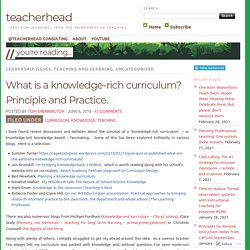
Some of this has been explored brilliantly in various blogs. Here is a selection: There are also numerous blogs from Michael Fordham (Knowledge and curriculum – Clio et cetera), Clare Sealy (Memory not memories – teaching for long term learning – primarytimerydotcom) or Christine Counsell: the dignity of the thing Along with plenty of others, I initially struggled to get my ahead around this idea. Pub quiz or published? What are the aims of a knowledge-rich curriculum? I have been an advocate of a knowledge-rich curriculum since around 2013, which is relatively recently and in that time I have experienced several iterations of this approach to curriculum. Being a recent convert to this thinking about curriculum and having made an intellectual journey over the last few years has led me to be quite evangelical about why a knowledge-rich curriculum, and the knowledge-thorough teaching that it requires, is crucial to a successful education.
Therefore I am particularly concerned that if the approach is not careful and considered we could be in danger of this becoming another initiative or fad. One of the problems that us knowledge types now face is that we have become the establishment. Sadie McCleary: On Using and Improving Knowledge Organizers at Uncommon Collegiate College HS. Reference sheets have been a consistent staple of Chemistry class for time immemorial – whether they are the Periodic Table or a sheet of equations, students always have something on their desks to reference and use during class.
As part of the TLAC Fellowship, my Uncommon Collegiate College High School colleague Denarius Frazier and I had the opportunity to learn about Knowledge Organizers. I was excited to experiment with them because they fit into and build upon a system (reference sheets) I’ve already built in my classroom but could allow me to focus on knowledge-building, an aspect of learning that has been traditionally overlooked a bit. Both Denarius and I are instructional coaches and teachers at our school, and we have experienced the challenge of building knowledge in our own classrooms as well as witnessing it in our teachers’ classrooms. Results have been mixed- nothing is simple with new initiatives in school. These were useful. Confessions of a curriculum leader - onebetweentwo. Pub quiz or published? What are the aims of a knowledge-rich curriculum? Drill and Thrill. On joyful low-stakes testing. For far too long I persisted in the belief that source inference in history was a generic skill.
Whether this was because of a fault in my training, environments in which this sort of misconception was typical, or my own stupidity for unthinkingly repeating methods that didn’t work, the effect was the same. It meant that I taught ‘sources’ in a decontextualized, bolt-on fashion, as if it were possible to work with them successfully without deep knowledge of period and context. When pupils performed badly on source based questions, which they invariably did, I thought the answer was to give them more sources to work with. I think my reasoning went, if I thought about it at all, that if I just turned up the volume, at some point something would just sort of click. English ko. Curriculum letter knowledge organisers at cps nov 2016. Year 3 knowledge organiser autumn term geography italy. Year 3 knowledge organiser autumn term history iron age to stone age. Primarytimerydotcom – primerytimer. HOW2 Knowledge Organisers. Are ‘knowledge organisers’ now essential tools in the classroom?
It was Twitter that kicked things off. A growing number of teachers were sharing intricately crafted documents that laid out the core details of a subject or topic in an organised and easily accessible way. Word spread. Knowledge organisers (KOs) quickly became the “in” thing. The reaction was mostly positive: these were useful tools for staff and students alike – both to make clear to the teacher the core knowledge that they should be instilling in students, and to help pupils to organise their memory of key facts.
Then came the backlash: “They’re spoon-feeding children”; “They’re unsuitable for our youngest students – they have no place in primary”; “Whose knowledge is it anyway?” Mark Enser: At our school, and in my department, we use KOs much like we did a crib sheet. Nartures Marvels The Earth. Y6 Space Knowledge Organiser. Viking KO. Vikings___year_4_CS_version.docx. Accessible reading mode Status Bar Page 1 of 2 Press Alt+Shift+A for accessibility help. Knowledge Organisation – …to the real. Top five low-stakes quizzing tools for teachers – ICTEvangelist.
Now I know there are more than five and I rate lots of different tools that I haven’t mentioned here such as ClassKick, Quizalize, GoFormative, Google Forms, Mentimeter, Poll Everywhere… there are so many of them. Primary Knowledge Organisers. Primarytimerydotcom – primerytimer. On Knowledge Organisers.
When Jon Brunskill recently agreed to share his work on Knowledge Organisers in primary school, I was excited to see what he came up with. Using Knowledge Organisers in Primary. There is huge variation in the process of planning a unit of work in primary. This post is about how I’ve gone about planning a two (possibly three) week unit on the lunar landing for my year two class. What do students need to remember? – Leadout Education Consulting.
Knowing stuff is cool. Does he write his own rhymes? Well sort of, I think ’em. That means I forgot better s*** than you ever thought of.– Kanye West, Diamonds from Sierra Leone.